Alcohol, tobacco, and illicit drugs can have a range of health impacts on the people who use them. When used by someone who is pregnant, health impacts can carry over to their unborn child, including lower birth weights, miscarriage and a range condition known as Fetal Alcohol Spectrum Disorder (FASD). Alcohol, nicotine, and illicit drugs can also cross into breastmilk, which can then be consumed by a baby during breastfeeding (Department of Health and Aged Care 2019, 2022 and 2023).
Recommendations exist for women who are pregnant, planning on becoming pregnant, or breastfeeding:
- To prevent harm from alcohol to their unborn child, women who are pregnant or planning a pregnancy should not drink alcohol. For women who are breastfeeding, not drinking alcohol is safest for their baby (NHMRC 2020).
- The safest option for pregnant women is to not smoke at all. Quitting smoking before or during pregnancy, or even after the baby is born, is the best way to protect themselves and their baby (Department of Health and Aged Care, 2023).
- Evidence shows a range of maternal and perinatal risks associated with substance use. There are benefits to reducing and ceasing their use during pregnancy (Department of Health and Aged Care, 2019).
In July 2020 a mandatory requirement for pregnancy warning labels on all alcoholic beverages (with more than 1.15% alcohol by volume) was introduced in the Australia New Zealand Food Standards Code. A three-year transition period ended on 1 August 2023, meaning all alcoholic beverages must display the warning label from that date. Data collected in the 2022–2023 National Drug Strategy Household Survey was collected before August 2023 when the labels became mandatory.
Alcohol consumption while pregnant continues long-term decline
Among all women who were pregnant at some point in the previous 12 months in 2022–2023, around 1 in 4 (28%) reported consuming alcohol while they were pregnant. While any alcohol consumption may cause harm to an unborn baby (NHMRC 2020), this does represent an improvement, as the proportion of pregnant women reporting that they consumed alcohol at some point during their pregnancy has declined substantially since 2013 (Figure 1).
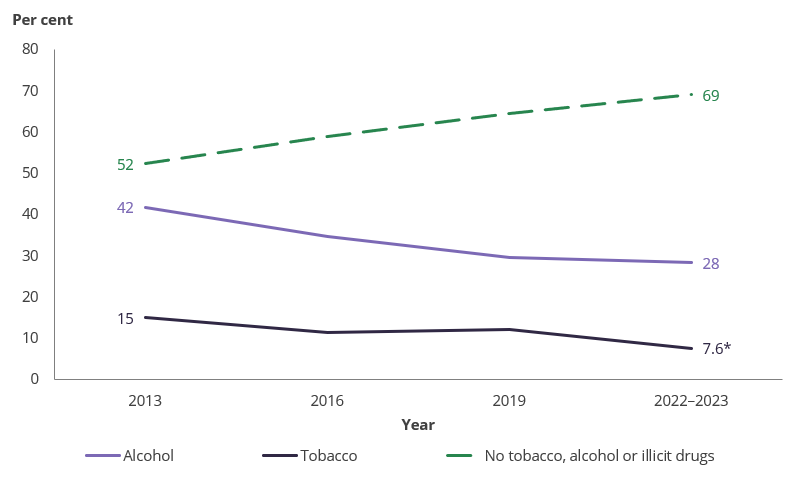
* Estimate has a relative standard error of 25% to 50% and should be interpreted with caution.
Source: NDSHS 2022–2023, Table 10.21.
Positively, between 2013 and 2022–2023, the proportion of women who reported smoking tobacco while pregnant almost halved, declining from 15.0% to *7.6%.
Alcohol consumption before women knew they were pregnant remains high
The decline in substance use among all women who were pregnant in the previous 12 months includes women who did not know they were pregnant at the time they consumed alcohol. Education campaigns, including Every Moment Matters, have been implemented to improve awareness around alcohol consumption, particularly in ceasing alcohol consumption from the moment a person starts trying to conceive (Department of Health and Aged Care, 2022).
Figure 2 shows use of alcohol and other substances among women before and after they knew they were pregnant. This may include those who were trying to become pregnant but did not know they were pregnant yet, but also women who were not planning on becoming pregnant.
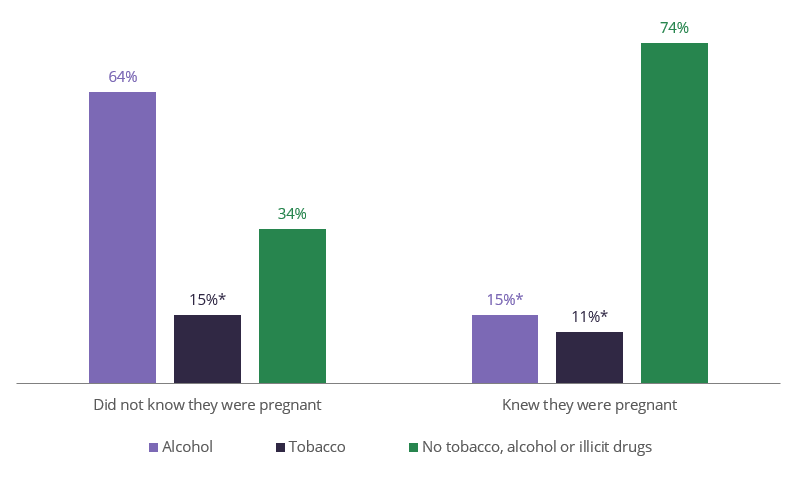
* Estimate has a relative standard error of 25% to 50% and should be interpreted with caution.
(a) Data are limited to women who had some period of time where they were pregnant but did not yet know they were pregnant in the previous 12 months.
Source: NDSHS 2022–2023, Table 10.21.
Almost 2 in 3 women (64%) who had a period of time when they did not know they were pregnant reported that they consumed alcohol while they were pregnant. Use of tobacco was also high in this group (*14.8%).
Once aware of their pregnancy, women were much less likely to have used alcohol (*14.9%), although use of tobacco (*11.2%) remained high.
Tobacco use while breastfeeding reduced
Use of alcohol and tobacco while breastfeeding is complex, as other factors (such as how much time passes between drinking alcohol and breastfeeding) can influence whether the baby is exposed to the substances that were used.
Australian guidance is that there are risks to smoking tobacco while breastfeeding, and if people do smoke while breastfeeding, it is better to wait until after the baby has been fed to minimise the baby’s exposure to nicotine and other chemicals (Department of Health and Aged Care, 2023). For women who are breastfeeding, not drinking alcohol is safest for their baby. There is some evidence that many women in Australia may employ strategies such as timing of alcohol use to minimise alcohol exposure to their infants (NHMRC 2020).
The National Drug Strategy Household Survey does not include questions on whether strategies were employed to minimise the baby’s exposure to alcohol, tobacco, or other illicit drugs through breastmilk, only whether the substances were used at any point while the woman was breastfeeding.
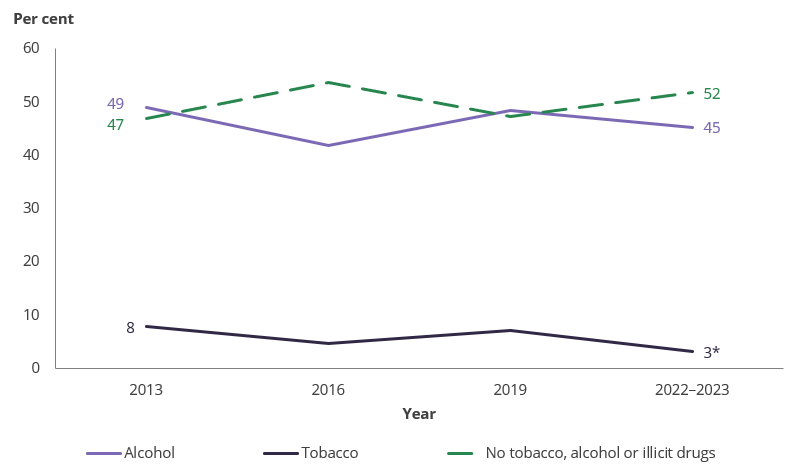
Source: NDSHS 2022–2023, Table 10.23.
In 2022–2023, almost 1 in 2 women (45%) who breastfed for any period of time in the previous 12 months had consumed alcohol during that time. This proportion has fluctuated but remained relatively stable since 2013, when 49% of women had done so (Figure 3).
There was a substantial reduction in the proportion of women who used tobacco while they were breastfeeding, from 7.0% in 2019 to just *3.1% in 2022–2023.
* Estimate has a relative standard error of 25% to 50% and should be interpreted with caution.
Did pregnant women receive advice around their alcohol consumption?
For the first time in 2022–2023, the National Drug Strategy Household Survey included questions on whether women who had been pregnant or breastfeeding in the previous 12 months had received any advice about alcohol consumption. Overall, close to half (48%) of women were advised not to consume any alcohol, but this was different depending on the cohort (Figure 4):
- Almost 2 in 3 women (62%) who had times of both being pregnant and breastfeeding in the previous 12 months were advised not to drink any alcohol, with a majority receiving that advice from a nurse or midwife (75%) and/or a doctor or specialist (57%).
- Nearly 1 in 2 women (47%) who had only been pregnant in the previous 12 months received any advice in relation to their alcohol consumption, mostly coming from a doctor or specialist (72%) and/or nurse or midwife (40%).
- For women who only had a period of breastfeeding in the previous 12 months, just 42% had been advised not to consume any alcohol, and *8.7% had been advised to reduce their alcohol consumption. Again, advice was most likely to come from nurses/ midwives (69%) and/or doctors/specialists (65%).
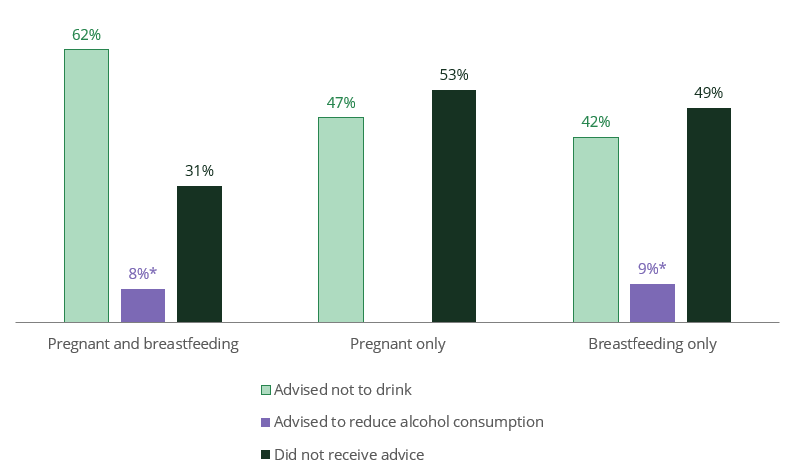
* Estimate has a relative standard error of 25% to 50% and should be interpreted with caution.
Note: Excludes those who reported that they did not drink alcohol.
Source: NDSHS 2022–2023, Table 10.24.
What did people believe about alcohol consumption while pregnant or breastfeeding?
With ongoing efforts to increase public awareness of the harms associated with consuming alcohol during pregnancy (Department of Health and Aged Care, 2022), the 2022–2023 National Drug Strategy Household Survey asked people whether they agreed with a series of statements about alcohol consumption. Results were broadly positive across the population, but there were still some areas for improvement (Figure 5):
- 87% of people agreed that pregnant women should not drink any alcohol during pregnancy, and only 5.6% disagreed.
- 80% of people agreed that if a female is actively trying to become pregnant, they should stop drinking alcohol, although 13.3% said that they were not sure.
- Conflicting with the Australian alcohol guidelines, 12.7% of people agreed that occasionally drinking a small amount of alcohol while pregnant would not harm the baby, and 17.1% said they were not sure.
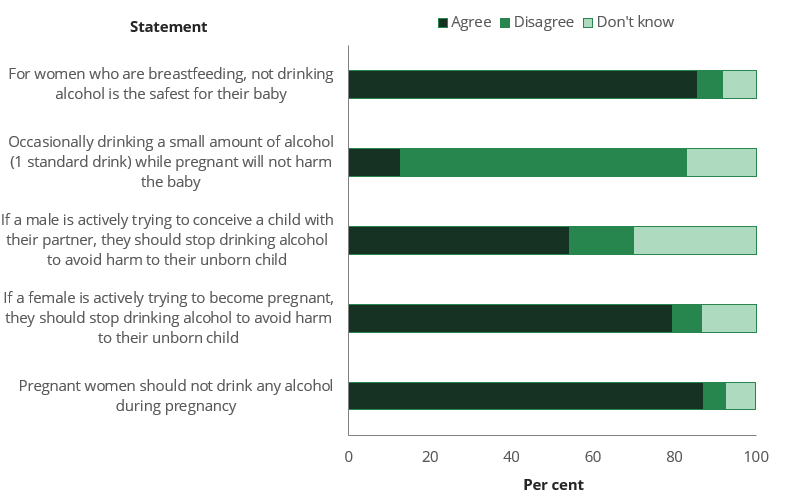
Source: NDSHS 2022–2023, Table 4.44.


